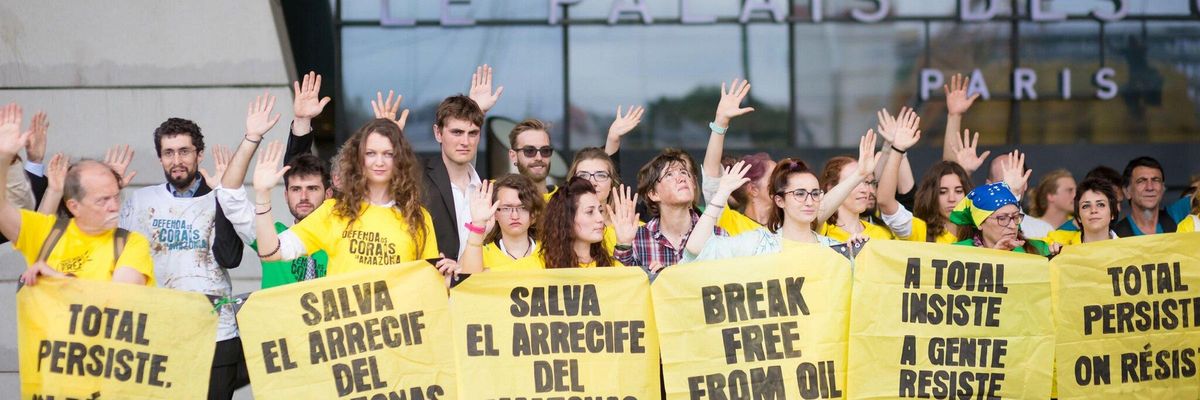Exxon knew. Shell knew. It turns out, Total knew, too.
"These revelations provide proof that TotalEnergies and the other oil and gas majors have stolen the precious time of a generation to stem the climate crisis."
The French oil major, rebranded to TotalEnergies earlier this year, knew 50 years ago that fossil fuels threatened the global climate and responded by denying science in pursuit of profit, according to research published Wednesday in the peer-reviewed journal Global Environment Change.
The "bombshell" study from three historians--which follows similarly damning exposes of ExxonMobil in 2015 and Royal Dutch Shell in 2017--comes as fossil fuel giants face growing legal efforts around the world to #MakePollutersPay for their significant contributions to the climate emergency.
Based on interviews and company records, the historians found that "Total personnel received warnings of the potential for catastrophic global warming from its products by 1971, became more fully informed of the issue in the 1980s, began promoting doubt regarding the scientific basis for global warming by the late 1980s, and ultimately settled on a position in the late 1990s of publicly accepting climate science while promoting policy delay or policies peripheral to fossil fuel control."
The trio also found that "Exxon, through the International Petroleum Industry Environmental Conservation Association (IPIECA), coordinated an international campaign to dispute climate science and weaken international climate policy, beginning in the 1980s."
Co-author Christophe Bonneuil, a historian at France's National Centre for Scientific Research, told Agence France-Presse that "we thought that only Exxon and the U.S. oil and gas giants were engaged in this kind of duplicity."
"Now we know that French majors also participated in this, at least between 1987 and 1994," Bonneuil said.
A spokesperson for Total told AFP that the company "openly acknowledged the findings of climate science 25 years ago," as well as "the link with the petroleum industry," and "TotalEnergies finds it regrettable to be called out for a situation from 50 years ago without highlighting the efforts, changes, progress, and investments made since then."
However, the study does detail some of the company's more recent behavior:
By the late 1990s, the French petroleum industry shifted away from openly disputing climate science but continued to expand its investments in upstream oil and gas production and employed rhetorical strategies that emphasized uncertainty, downplayed urgency, and deflected attention away from fossil fuels as the primary cause of global warming. By the mid 2000s, the merged entity Total intensified its efforts to build scientific credibility, endorsing the [Intergovernmental Panel on Climate Change] and hosting a conference on climate change. The company began to promote a division of roles between science and business, in which science describes climate change and business claims to solve it, reinforcing its claim to legitimacy in determining appropriate public and corporate policies. This framing enables Total to portray itself as a socially responsible petroleum company by wrapping continued investments in fossil fuel production in an attractive "energy transition" narrative.
Climate campaigners responded to the revelations with calls for governments and the global financial sector to force TotalEnergies to align with the Paris climate agreement by preventing new fossil fuel projects. The advocacy organizations 350.org and Notre Affaire a Tous launched a new campaign.
"These revelations provide proof that TotalEnergies and the other oil and gas majors have stolen the precious time of a generation to stem the climate crisis," the groups said in a joint statement. "The dire consequences of climate change we are now experiencing could have been avoided if Total executives 50 years ago had decided that the future of the planet is more important than their profits."
Justine Ripoll, campaign manager for Notre Affaire a Tous--one of the groups using the courts to hold the French government accountable for climate inaction--noted that "legal frameworks and lawsuits are proving to be more and more effective in forcing multinationals to respect their climate commitments, as demonstrated by the case of Shell in the Netherlands."
"But we must be vigilant: these legal initiatives are under constant attack from the lobbies of big business, as we are currently seeing with the E.U. corporate due diligence and accountability initiative or the U.N. binding treaty on transnational corporations," Ripoll added.
Clemence Dubois, 350.org France's team lead, asserted that "the intensive development of new oil and gas projects is a declaration of war against humanity."
"Total's plans to continue developing massive new oil and gas fields in the years to come could end up costing millions of lives," Dubois warned. "This is only possible though because of the support they receive from the financial sector. From all over the world, we are appealing to the banks: It is time to cut funding to Total."
Notre Affaire a Tous and 350.org's campaign includes a website featuring a petition that calls on CEOs of the commercial banks that finance Total and its projects to "stop immediately."
The #TotalKnew website explains that campaigners are targeting banks rather than "going after Total directly because we don't want their empty promises," and fossil fuel giants "need investments and project funding to keep their dirty oil and gas business going."
The Total expose was published less than two weeks before world leaders are set to come together in Glasgow, Scotland for a United Nations climate summit known as COP 26. Leading up to the event, scientists and energy experts have reiterated warnings that humanity must keep fossil fuels in the ground to ensure a habitable future planet.




